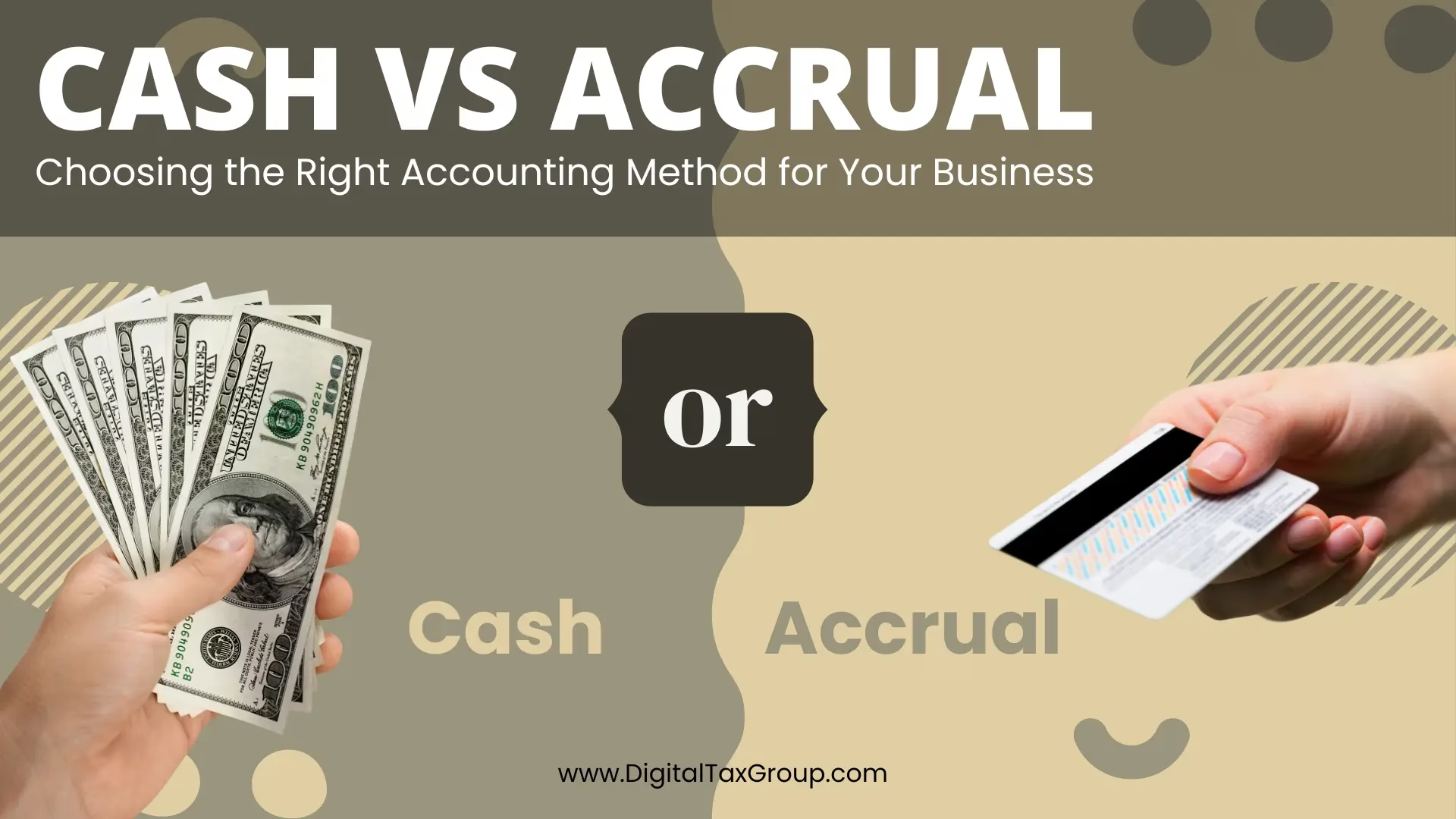Did you know that the accounting method you choose can significantly affect your bottom line and tax strategy? Whether you’re starting a new business or looking to streamline your financial processes, choosing between cash vs accrual accounting is a crucial decision. This choice influences everything from cash flow management to tax filings and overall financial accuracy.
In this guide, we’ll explain the two primary accounting methods—cash vs accrual—and walk you through how to decide which one is best for your business. We’ll also explore their impact on your taxes, financial reports, and overall business strategy.
By the end of this article, you’ll be equipped with the knowledge to make an informed decision about which accounting method is the right fit for your business.

What is Cash vs Accrual Accounting?
When managing finances, business owners often choose between cash accounting and accrual accounting. Let’s break them down:
Cash Accounting: A Simple Method for Small Businesses
Cash accounting is straightforward: you record transactions only when cash is received or paid. This method is ideal for small businesses or those without inventory.
Example:
If you’re a consultant who invoices a client, you only record income when the client pays you—not when you issue the invoice.
Pros of Cash Accounting:
- Simplicity: Easy to manage without advanced accounting software.
- Cash flow clarity: Provides a clear picture of available cash at any time.
- Minimal administrative effort: No tracking of accounts payable or receivable.
Cons of Cash Accounting:
- Limited insights: Fails to show a complete financial picture, especially for businesses with receivables or inventory.
- Not scalable: Larger businesses often can’t use this method due to GAAP requirements.
Learn more about cash accounting from the IRS Cash Accounting Guidelines.

Accrual Accounting: The Standard for Growing Businesses
Accrual accounting tracks transactions when they occur, not when money changes hands. This method is common among larger businesses and those adhering to GAAP.
Example:
If you complete a project in March but don’t get paid until July, accrual accounting records revenue in March (when the service was performed).
Pros of Accrual Accounting:
- Accuracy: Provides a full picture of your financial health by recognizing income and expenses as they occur.
- Mandatory for compliance: Larger businesses or those seeking investors must use accrual accounting.
- Supports growth: Ideal for businesses planning to scale.
Cons of Accrual Accounting:
- Complexity: Requires detailed records of payables and receivables.
- Cash flow challenges: Revenue may be recorded before payment is received, creating potential confusion about available cash.
Read more about accrual accounting standards in the GAAP Financial Guidelines.
Cash vs Accrual: Key Differences
| Aspect | Cash Accounting | Accrual Accounting |
|---|---|---|
| When Income is Recorded | When cash is received | When earned |
| When Expenses are Recorded | When cash is paid | When incurred |
| Simplicity | Easy to manage | More complex |
| Scalability | Best for small businesses | Best for growing businesses |
| Compliance | Not GAAP-compliant | Required for GAAP compliance |
How to Decide Between Cash vs Accrual Accounting
Choosing the right method depends on your business’s size, industry, and goals.
1. Business Size
- Cash Accounting: Suitable for small businesses, sole proprietors, or freelancers who don’t carry inventory.
- Accrual Accounting: Required for businesses with inventory, those exceeding $25 million in revenue, or companies seeking investors.
2. Cash Flow Needs
If your business experiences fluctuating cash flow or seasonal peaks, cash accounting offers real-time visibility. However, for businesses extending credit or managing long-term contracts, accrual accounting provides a clearer picture of financial health.
3. Tax Implications
- Cash Accounting: Delays taxable income until cash is received, offering potential tax deferrals.
- Accrual Accounting: Requires income to be recognized when earned, which may accelerate tax liabilities but gives a more accurate representation of finances.
Switching Between Cash vs Accrual Accounting
If your business outgrows its current accounting method, you can switch by filing IRS Form 3115.
Steps to Switch:
- Consult an accountant to evaluate the tax implications.
- File Form 3115 for approval from the IRS.
- Update your financial records to align with the new method.
Need help making the switch? Explore our financial advisory services to ensure compliance and smooth transitions.
- Learn about our tax compliance services.
- Ready to optimize your bookkeeping? Explore our bookkeeping solutions.
- Get strategic advice through our outsourced CFO services.
Final Thoughts
Choosing between cash vs accrual accounting is a pivotal decision. By understanding their differences, pros, and cons, you can select the method that aligns with your financial goals. If you’re unsure which accounting method fits your business, consult with a professional accountant or reach out to us for expert guidance.





